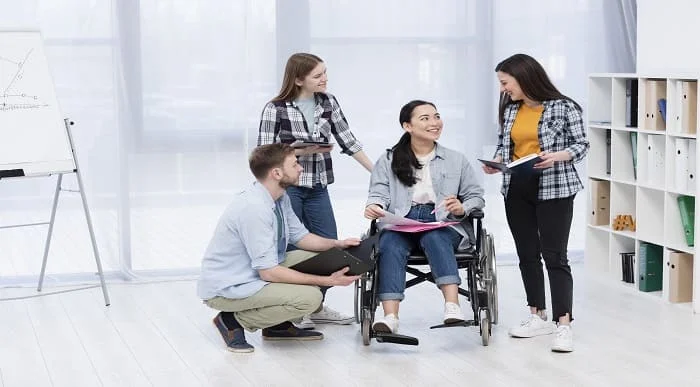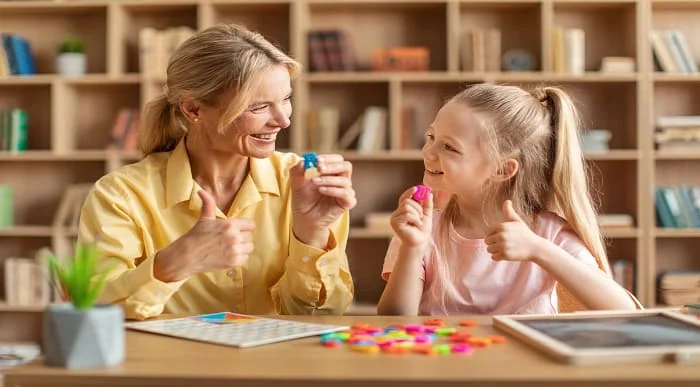Counselling & Psychology
What are Counselling Skills – Beginner’s Guide to Develop Counselling Skills
Most of us are more or less familiar with the term “Counsellor.” Counsellors are trained mental health professionals who address clients’ emotional and relationship issues and provide a safe and confidential environment to support people experiencing emotional difficulties.
But, what are counselling skills? Are “counselling” and “counselling skills” all the same or two different terms?
When communicating with clients, counsellors need to possess counselling skills to comprehend what the client is going through and give feedback. Since clients with mental health issues are usually vulnerable, their emotional states require a particular approach; and the counsellor’s good counselling skills enables them to understand the client’s needs and work accordingly.
Explore more about what are counselling skills, what is the difference between counselling and counselling skills, what are basic counselling skills and many more from this blog.
Table of Content
- What are Counselling Skills?
- What are the Core Counselling Skills?
- Who Uses Counselling Skills?
- Why are Counselling Skills Important?
- How to Improve Your Counselling Skills?
- What is the Difference between Counselling Skills and Counselling?
- How to use your Counselling Skills?
- Conclusion
- Frequently Asked Questions [FAQ]
- What to Read Next:
What are Counselling Skills?
According to the BACP, “Counselling skills are a combination of values, ethics, knowledge and communication skills used to support another person’s emotional health and wellbeing.”
Counselling skills are technical traits that are used by counsellors to listen and better understand their clients. Using these skills, counsellors help their clients to overcome obstacles and do better in their lives. These skills also help to build and maintain rapport, establish trust and ensure that the clients feel heard and understood.
What are the Core Counselling Skills?
A professional counsellor should try using counselling skills consciously to comprehend clients’ issues and aid in their decision-making. Some of the core counselling skills are-
Active Listening-What is active listening in counselling skills?
Active listening is when you focus with full attention on what the client is saying, understand their message, comprehend information and respond thoughtfully. It encourages the client to open up their side of the story. Listening is not only about what you hear but about being observant of what your client is speaking. But remember that eye contact and tone of voice also helps us establish a deeper connection with the client.
Paraphrasing- It is the ability to summarise effectively what a person has just said. Paraphrasing techniques is one of the most important skills in counselling as it illustrates that a counsellor has actively listened to the information delivered throughout a session.
Focusing- A counsellor needs to utilise focusing techniques to establish the core issues of concern and ensure that the topic of discussions is not shifting away, but rather remain within the pertinent challenges a client is trying to work through.
Summarising- Counsellors often need to summarise in order to condense information in response to what a client is saying and to validate what they are feeling.
Allowing Silence- Silence can play an effective role in the counselling space. Allowing a client to silence means giving them the time to think as well as talk. It also assists in building a trusting and supportive relationship between a counsellor and a client.
Use of Questions- Questions help counsellors to clarify their understanding of what the client is feeling. Counsellors should utilise both open-ended and closed-ended questions to interpret what a client is saying. Usually, open-ended questions are helpful to gather detailed information, whereas closed-ended questions help to get specific answers.
Self-awareness- Counsellors should be aware that their body language, gestures and facial expression may affect a client’s willingness to share their personal information. As a counsellor, you should focus on these techniques to ensure that you do not accidentally exhibit signs of getting bored or frustrated.
Building Rapport- By rapport, it means having a connection with the other person. In counselling, building rapport with clients is important, whatever model of counselling the counsellor is working with.
Showing Empathy- While professional boundaries remain important, let your clients know that you have compassion and empathy towards their situation. Guide them with dedication through their struggles so that they can find their way to a better situation.
 Looking for a Diploma Course in Counselling and Psychotherapy?
Looking for a Diploma Course in Counselling and Psychotherapy?
Who Uses Counselling Skills?
Besides counsellors, counselling skills are practised by various professionals in a number of work roles.
Some professions where counselling skills would be useful are-
- Nursing
- Social work
- Medical profession
- Ambulance service
- Police
Why are Counselling Skills Important?
Good counselling skills are valuable since they help to create more meaningful, empathetic interactions with clients in a psychotherapy environment. A client visits counsellors when they face various issues in life and when they are unable to cope up with those issues. Counselling skills aid in identifying and solving the problems of clients in the most effective way.
Counsellors without proper counselling skills often fail to understand their clients and cannot provide the right therapy. Clients, too, struggle to open up and stop trusting their counsellor. In such a situation, a counsellor loses clients and the clients suffer due to not having the proper treatment.
How to Improve Your Counselling Skills?
You can try following the steps mentioned below to improve your counselling skills and therapeutic relationships with clients.
Learning to Interpret Body Language
Understanding clients’ body language is undoubtedly a crucial aspect of your counselling skills. As a counsellor, if you lack this particular skill, you should work on it.
You can try analysing body language in your daily life that would help you interpret clients’ body language about specific topics.
For example, you can observe the facial expression, hand movements and posture of someone having a one to one interaction or someone you pass on the street. While observing, try to assess how they use body language.
Practising Counselling Sessions with a Friend
You can practise your counselling skills with a trusted friend of yours who might pretend to be your client. You can have a mock session and record yourself to do a self-assessment of your skills afterwards.
Ask your friend about their thoughts and what they liked and disliked about your counselling style, including the questions you asked and your body language.
Working on your Professional Development
As a counsellor, you should have a commitment to your professional development otherwise you will find it extremely difficult to provide the best service to your clients.
Professional development options include attending workshops, conferences, doing courses like Diploma in Counselling & Psychotherapy, Child Counsellor Training Course and so on. Other learning pathways include online learning and peer or group supervision.
Undergoing Therapy Sessions
Counsellors may find it helpful to consider undergoing therapy themselves. The experience gained during the therapy sessions will benefit their personal growth, empathic understanding, and knowledge of the psychological process.
Top Courses of this Category
Finding a Supervisor
You can look for an experienced counsellor who can supervise you to help improve your counselling skills. Having a supervisor means you can discuss what happened in a counselling session and find out the most effective counselling techniques to use during your sessions with clients.
At this stage, you can check out our other blog, “10 Effective Communication Skills For Social Workers.”
What is the Difference between Counselling Skills and Counselling?
Counselling skills are not only utilised by professional counsellors; rather there are people across the country who work in different settings like care homes, hospitals, clinics, and use counselling skills in their professional roles.
For these people, counselling skills are embedded into how they carry out their jobs and help improve standards. They use their counselling skills within their day to day role as they meet the people they care for.
A counsellor, however, uses counselling skills, but counselling is their primary professional role. Counsellors undergo training that includes theories to understand and help clients work through a wide range of problems.
Counselling sessions happen at a regular time and place which is formally agreed with the client. A counsellor agrees to work within an ethical framework for counselling.
Counselling is the act of helping the client to see things more clearly, from a different view-point. This can enable the client to focus on feelings, experiences or behaviour, with a goal of facilitating positive change. Counselling is not about giving advice, being judgemental, attempting to sort out the problems of the client or getting emotionally involved with the client.
Counselling skills enable counsellors and other professionals to relate better to the people they are talking to. Active listening is a part of counselling skills and the art of being listened to can be practised by almost anybody. The effectiveness of being actively listened to can have a huge impact on our lives as it can enable us to feel better about ourselves.
Besides, you can visit our other blog, “50 Examples of Transferable Skills that Employers are Looking for.”
How to use your Counselling Skills?
Knowing how to use counselling skills and the objectives of counselling are as important as having them. It defines the qualities of a good counsellor. Have a look below to learn about how to use counselling skills effectively.
Review client notes before and after sessions
You should keep notes and make sure to look over those notes from previous sessions with a particular client in order to prepare for an upcoming counselling session. This can be helpful with information recall, and questioning during your next session with them.
Be brief when reflecting back
While reflecting back to your clients, do not stretch your words unnecessarily. The speaker or the client should do most of the talking. Try to be brief as much as possible but then again, do not miss any point you should be saying.
Use your own words to reflect back
It is better to use your own words while summarising or paraphrasing. Using exactly the client’s words would seem like you are mimicking. The client might also doubt your counselling skills.
Refrain from sharing client information with coworkers
You should not discuss a client’s personal matters with coworkers in order to uphold client confidentiality. If you need to consult with your coworker about a particular case, consider keeping the information more general and do not disclose the client’s name.
Do not force clients for personal information
Instead of asking too many irrelevant personal questions to the client, allow them to willingly share their problems with you. Try to build trust with your client and give them the time and space to get more comfortable with you.
Be aware of your body language
You should be careful about your body language during a counselling session. A client might worry about being judged when they disclose particular information. To make them feel comfortable, maintain a warm smile and expression to reassure your client that you are there to listen.
Conclusion
Counselling skills aid counsellors to become better professionals which eventually help improve the quality of life of their clients. That is why counsellors should try developing their counselling skills. Hopefully, the blog could describe and clarify what are counselling skills and their importance in the counselling profession.
Frequently Asked Questions [FAQ]
Who uses counselling skills?
Counselling abilities are useful in a variety of settings. They are utilised in the counselling setting but also by many individuals in their daily lives and at work. Counselling abilities may be used by teachers, shop workers, librarians, police officers, and, well, pretty much everyone.
What are counselling skills?
The following the some of the skills that are essential for a counsellor.
- Communication skills
- Problem-solving
- Listening skills
- Critical thinking
- Observational skills
- Ethics
- Empathy
- Self-awareness
- Flexibility
- Confidence
What is the importance of Counselling skills?
Effective counselling skills are critical in establishing a solid relationship between the client and the therapist. When these skills are integrated, they assist clients in going through therapy and achieving their objective of overcoming the stresses of contemporary life and living a more fulfilled life.
What to Read Next:
- What is the Difference Between Coaching and Counselling? Know the Truth
- How to Become a School Counsellor – 8 Essential Steps to Follow
- What is Supervision in Counselling: A Comprehensive Guide
- How to Address The Power Imbalance in Counselling?
- What is Guidance and Counselling? Importance of Guidance and Counselling
- What are the difference between directive, non directive and eclectic counselling
- How Long Does It Take to Become a Counsellor










